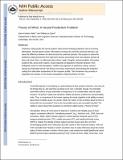Theory of Mind: A Neural Prediction Problem
Author(s)
Koster-Hale, Jorie; Saxe, Rebecca R
Downloadnihms-586350.pdf (365.3Kb)
PUBLISHER_CC
Publisher with Creative Commons License
Creative Commons Attribution
Terms of use
Metadata
Show full item recordAbstract
Predictive coding posits that neural systems make forward-looking predictions about incoming information. Neural signals contain information not about the currently perceived stimulus, but about the difference between the observed and the predicted stimulus. We propose to extend the predictive coding framework from high-level sensory processing to the more abstract domain of theory of mind; that is, to inferences about others' goals, thoughts, and personalities. We review evidence that, across brain regions, neural responses to depictions of human behavior, from biological motion to trait descriptions, exhibit a key signature of predictive coding: reduced activity to predictable stimuli. We discuss how future experiments could distinguish predictive coding from alternative explanations of this response profile. This framework may provide an important new window on the neural computations underlying theory of mind.
Date issued
2013-09Department
Massachusetts Institute of Technology. Department of Brain and Cognitive SciencesJournal
Neuron
Publisher
Elsevier/Cell Press
Citation
Koster-Hale, Jorie, and Saxe, Rebecca. “Theory of Mind: A Neural Prediction Problem.” Neuron 79, 5 (September 2013): 836–848 © 2013 Elsevier Inc
Version: Author's final manuscript
ISSN
0896-6273
1097-4199